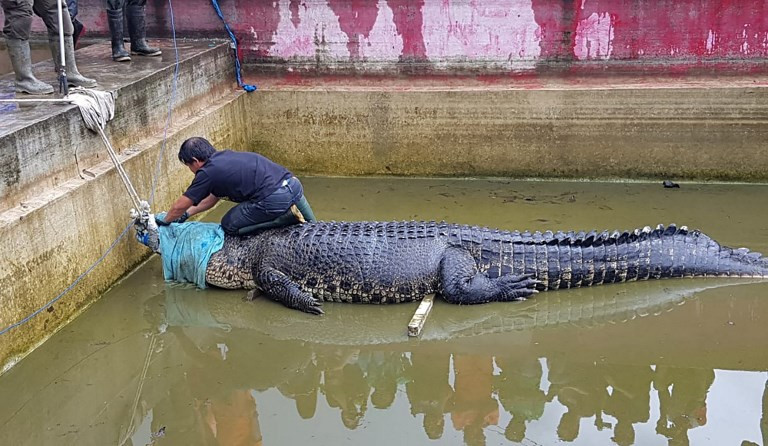Popular Reads
Top Results
Can't find what you're looking for?
View all search resultsPopular Reads
Top Results
Can't find what you're looking for?
View all search resultsJambi wildlife agency investigates death of crocodile
The saltwater crocodile is a protected species, as mandated in a 2018 environment and forestry ministerial regulation.
Change text size
Gift Premium Articles
to Anyone
 A 4.4-meter-long crocodile named Merry is secured before being taken out of its enclosure in Minahasa in North Sulawesi, after a woman on Jan. 10, 2019 was mauled to death in the reptile's enclosure. The giant reptile, which was owned illegally, was sedated and removed from its enclosure on Jan. 14 in a three-hour-long operation that involved dozens of people, including conservation officials, the army and police, and will be transferred to a conservation area. (AFP/Handout / Balai KSDA Sulawesi Utara )
A 4.4-meter-long crocodile named Merry is secured before being taken out of its enclosure in Minahasa in North Sulawesi, after a woman on Jan. 10, 2019 was mauled to death in the reptile's enclosure. The giant reptile, which was owned illegally, was sedated and removed from its enclosure on Jan. 14 in a three-hour-long operation that involved dozens of people, including conservation officials, the army and police, and will be transferred to a conservation area. (AFP/Handout / Balai KSDA Sulawesi Utara )
T
he Jambi Natural Resources Conservation Agency (BKSDA Jambi) has launched an investigation into the death of a 4-meter-long saltwater crocodile in Teluk Dewan village, East Tanjungjabung regency, Jambi.
“The crocodile was found dead on Thursday when local residents were cleaning an artificial canal using an excavator,” BKSDA Jambi head Rahmat Saleh said on Friday.
The residents, he added, claimed the machine’s operator had hit something upon cleaning the canal. When he raised the excavator’s arm, he found a saltwater crocodile in it.
A team from the agency has moved the animal and questioned the operator regarding the incident.
“We didn’t apprehend him,” Rahmat said.
Read also: Missing boy found dead inside a crocodile in Maluku
Anwandi, a local resident who had witnessed the incident, said residents had told the operator to remove the crocodile from the canal.
“Maybe something happened when we placed the animal on land, causing its death,” Anwandi said.
The saltwater crocodile is included in a list of protected animals detailed in a 2018 environment and forestry ministerial regulation.
A 1990 law on natural resources conservation prohibits the killing of protected species, except in emergency situations that threaten human life. Anyone convicted of deliberately violating the law faces a maximum sentence of five years in prison, as well as a fine of Rp 100 million (US$6,328).
Another resident, Iswanto, said saltwater crocodiles were common in the area and often preyed on residents’ livestock.
According to the International Union for Conservation of Nature (IUCN), the saltwater crocodile is commonly found in the inland waters of northern Australia, eastern India and Southeast Asian countries, including Indonesia.
“We’re afraid of the animal. Sometimes, we don’t know whether our activities would provoke a crocodile to attack us,” Iswanto said.
Jambi saw several crocodile attacks on humans last year. Environmentalists believed such incidents were caused by habitat destruction, such as converting peatlands into oil palm plantations and illegal mining in rivers. (nal)









